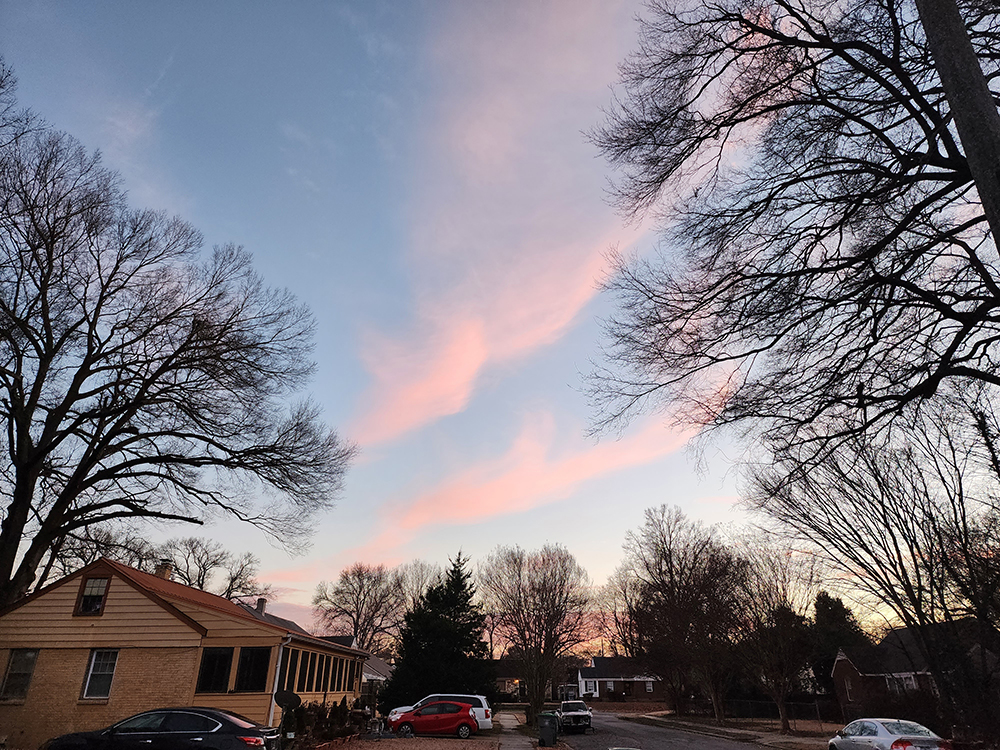It is a kind of love, is it not?
How the cup holds the tea,
How the chair stands sturdy and foursquare,
How the floor receives the bottoms of shoes
Or toes. How soles of feet know
Where they’re supposed to be.
I’ve been thinking about the patience
Of ordinary things, how clothes
Wait respectfully in closets
And soap dries quietly in the dish,
And towels drink the wet
From the skin of the back.
And the lovely repetition of stairs.
And what is more generous than a window?
— “The Patience of Ordinary Things” by Pat Schneider
Emerging reports of a summer Covid resurgence got me thinking back to 2020 when the world stood still, and I stood still with it. There was uncertainty, and pangs of anxiety accompanied the not-knowing of it all. But somehow through the noise, I found a quiet rhythm, a peace I hadn’t felt before — or since.
When we all hunkered down, a sense of unity took hold. A portion of our city (more than 2,000 people) posed for portraits in the windows and doors of their homes for what would later become Jamie Harmon’s Memphis Quarantine photo book. Across the world, in Spain, France, Italy, India, Germany, and elsewhere, neighbors sang together from balconies and rooftops, in celebration of their local healthcare workers or simply to entertain themselves, to lighten the load of fear and boredom, to connect with other humans.
I’ve written before in this paper how I walked hundreds of miles during lockdown. And I’ve told friends that those walks saved my life — or my mental health, at least. I photographed ants marching across sidewalks, bees alight on blooms, birds on power lines, the patterns on fallen leaves. Have you ever noticed how a sprawling stretch of tree branches resembles the intricacy of human veins? Do you know what causes a sunset to be a breathtaking purplish pink? How many times have you stopped to admire crepuscular rays beaming from beyond fluffy clouds?
Three years ago, we were forced to be patient, to pause and reflect — and we had plenty of time to do such things. We baked homemade bread. We held drive-through parades for graduations and birthdays. We talked for hours on video calls with friends and family near and far. There was a tangible collective empathy. Yet now, we’re hurried again. We don’t have time to wait in line or give a second thought to the man asking for change in the parking lot. Hardly a moment for a phone call. No patience for ordinary things.
But ordinary has become … another mass shooting, another person dead at the hands of police, another law stripping civil rights, another wildfire, another rent increase, another tragedy, and another, and another. I guess what I’m saying is, three years on it’s all back in full force. And no one seems to mind. Although “it” was always there, in some form, so many are back to not caring, back to “not my problem.” Back to every man for himself.
This quote from an August 28th Time article, “Pandemics Don’t Really End — They Echo,” stood out to me: “Pandemics have always frayed the social fabric, disrupted economies, deepened social divides, and intensified prejudices, leaving behind psychological scars — all of which have lasting political repercussions.”
So now, as we live amid the rubble carrying these psychological scars, do we even take notice of the soles of our feet as they scurry from point A to point B? To the steam rising from the cup of hot tea? To the family mourning the loss of a child due to gun violence? To the displaced? To the disadvantaged?
I remember when we gave a damn — about other people, about the present moment, about the beauty in generosity and fellowship.
It was a kind of love, was it not?
